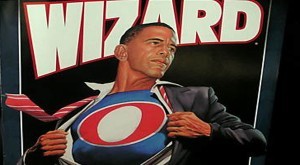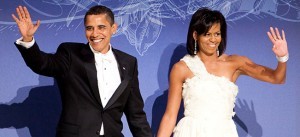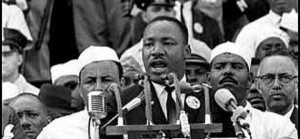For Immediate Release
February 26, 2015
East Room
4:38 P.M. EST
THE PRESIDENT: Hello, everybody! (Applause.) Welcome to the White House. I want to thank Saheela for the wonderful introduction. In case you all did not hear properly —
MRS. OBAMA: You can say it again one more time.
THE PRESIDENT: I’m just going to repeat this just so you understand.
MRS. OBAMA: And let’s listen up.
THE PRESIDENT: Saheela got into Harvard at 15. (Applause.)
MRS. OBAMA: She didn’t mention that.
THE PRESIDENT: I don’t know what you all were doing at 15. (Laughter.) Speaks four languages. The Arabic is like a major or minor, but has four of them. Is studying neurobiology. Was listed among the “World’s 50 Smartest Teenagers.” (Applause.)
Michelle is “Umm.” (Laughter.)
MRS. OBAMA: Umm, umm, umm.
THE PRESIDENT: Let me just say, there are a lot of teenagers in the world. (Laughter.) Saheela is like one of the 50 smartest ones. That’s pretty smart. (Applause.) And she’s a wonderful young lady. She’s like the State Department and the National Institute of Health all rolled into one. (Laughter.) And we are so proud of your accomplishments and all that lies ahead of you. And you reflect our history. Young people like inspire our future.
And give a big round of applause to her mom who is here. (Applause.) Mom is just filming the whole thing.
MRS. OBAMA: We see you! You’re right there!
THE PRESIDENT: We can’t even see her because she’s got her iPad in front of her. (Laughter.) Nothing like bragging about somebody’s children. (Laughter.)
We are joined this evening by members of Congress, including Leader Nancy Pelosi — (applause) — members of the Congressional Black Caucus. (Applause.) I want to congratulate the Association for the Study of African American Life and History — which is the group that gave us Black History Month — on your centennial. Give them a big round of applause. (Applause.)
All right, that guy, don’t get carried away now. (Laughter.)
MRS. OBAMA: He can get carried away.
THE PRESIDENT: I don’t know, he was — (laughter.)
Now, as always, this month is a chance to celebrate the central role that African Americans have played in every aspect of American life — marching for freedom and equality, jobs and justice — making a profound contribution to our culture. And here at the White House, we’re committed to honoring that legacy. Earlier this month, for example, we opened up the newly-restored Old Family Dining Room to the public for the first time — and it now includes a painting by Alma Thomas called “Resurrection” –and that’s the first in the White House Collection by an African American woman. Michelle made that happen, and we could not be prouder of her for that. (Applause.)
You don’t get carried away, either. (Laughter.)
But for the past couple of years, we’ve also been marking important milestones in that journey: The 50th anniversary of the Civil Rights Act. The 50th anniversary of the March on Washington. The 50th anniversary this year of the Voting Rights Act.
Next week, Michelle and I and the girls will be traveling to Selma to pay tribute not just as a President or a First Lady or as African Americans, but as Americans — to those who changed the course of history at the Edmund Pettus Bridge. Not just the legends and the giants of the Civil Rights Movement like Dr. King and John Lewis, but the countless American heroes whose names aren’t in the history books, that aren’t etched on marble somewhere — ordinary men and women from all corners of this nation, all walks of life, black and white, rich and poor, students, scholars, maids, ministers — all who marched and who sang and organized to change this country for the better.
We happen to be blessed to have some of those foot soldiers for justice here today, folks like Ms. Mattie Atkins. Ms. Mattie Atkins, wave just a little bit. She’s right here. (Applause.) Early in 1965, Mattie — who was just 27 years old, mother of five — joined with others in her community to march around the Marion Courthouse for their right to vote. And tensions ran high. The threat of violence mounted. But at night, the protesters would gather in a church and resolve to come back the next day.
And Ms. Atkins remembers the terrible violence on the night protesters tried to march to the jail, the night that Jimmie Lee Jackson was shot. Ms. Atkins remembers running into the church for safety, wiping the blood from the face of a fellow protester, and then going home to her children who were sleeping safe and sound in their beds.
And she still went back the next day, because despite the doubts and the fear, she knew that she was doing the right thing for her children and their future. And Ms. Atkins went on to help register folks to vote. She ran for office herself, became the first woman elected to her local school board in Perry County.
Next week, the world will turn its eyes to Selma again. And when it does, I want everyone to remember that it was because of people like Ms. Atkins and all the others who are here today that we celebrate. But they also remind us, they stand as testimonials to the fact that one day a year is not enough to honor the kind of courage that they showed. One month a year is not sufficient to take on their example and to celebrate the power of a movement. That’s something that we have to do, each and every one of us, every day, living up to their example, then handing it on to our own children, and our children’s children.
And today, on the third anniversary of Trayvon Martin’s death, showing all of our kids — all of them — every single day that their lives matter — that’s part of our task. I want to thank Trayvon’s parents for being here on what’s a very difficult day for them. (Applause.)
It takes all of us to show our young people, as Ms. Atkins puts it, that “where we are today didn’t come easy, it came through thick and thin.” “That’s what I tell my children,” she says, “to stand up for what’s right.” It’s a simple thing to say; sometimes it’s hard to do. But progress in this nation happens only because seemingly ordinary people find the courage to stand up for what is right. Not just when it’s easy, but when it’s hard. Not just when it’s convenient, but when it’s challenging.
We don’t set aside this month each year to isolate or segregate or put under a glass case black history. We set it aside to illuminate those threads — those living threads that African Americans have woven into the tight tapestry of this nation — to make it stronger, and more beautiful, and more just, and more free.
What happened in Selma is quintessentially an American experience, not just an African American experience. It speaks to what’s best in this country. It remind us that the history of America doesn’t belong to one group or another; it belongs to all of us -— that idea, this experiment built on a shared story of people bound together by shared ideas, shared ideals, certain inalienable rights of equality and justice and liberty for all people.
So I want to thank those who made that extraordinary contribution for setting such a wonderful example for each of us. And I know that when I take Malia and Sasha down with Michelle next week, down to Selma, part of what I’m hoping to do is to remind them of their own obligations. Because there are going to be marches for them to march, and struggles for them to fight. And if we’ve done our job, then that next generation is going to be picking up the torch, as well.
All right? Thank you, everybody. God bless you. God bless the United States of America. (Applause.)
END
4:48 P.M. EST





